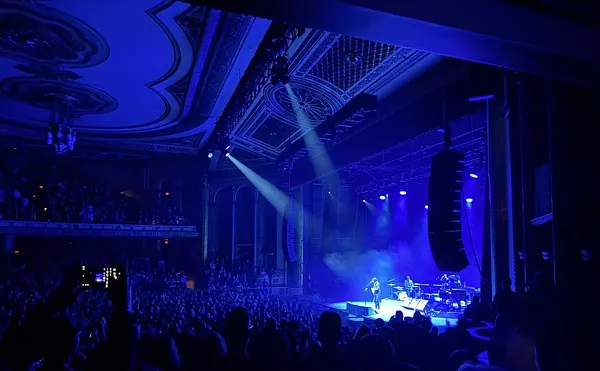
Audio By Carbonatix
[
{
"name": "GPT - Leaderboard - Inline - Content",
"component": "35519556",
"insertPoint": "5th",
"startingPoint": "3",
"requiredCountToDisplay": "3",
"maxInsertions": 100,
"adList": [
{
"adPreset": "LeaderboardInline"
}
]
}
]
Meanwhile, a pot of chicken and rice is cooking in the kitchen. She is in the living room of our Detroit home showing me how she would pass before the reviewing stand when playing mas (short for masquerade) during Trinidad's Carnival. It's a long road to reach the stand. A lot of hot music and hot rum. But keeping your hands up in the air is the best way to keep the blood in your feet where it needs to be to make a good showing in front of the judges. This is Trinidad and Tobago's Carnival, being recreated for the umpteenth time in our home while Mama cooked dinner.
There's nothing like a good merengue or salsa at the Puerto Rican Club to bring memories of dancing Trinidadian mamas to life. Merengue can be a fast-paced dance, but it's the one I'd easily see mama doing at the Club. Moving those feet left to right. Steady. Steady. Right to left. And with her hands in the air. Merengue is a little like what Trinidadians would call chippin down the road in the Carnival parade: feet shuffle, hips move in a loose figure eight, shoulders bounce back and forth.
Yes, Gyul, dis is how yuh does keep de blood from rushin to yuh fingertips. Oui foote.
The Puerto Rican Club on Fort Street in southwest Detroit is the Saturday night dancing scene for families in the Puerto Rican community who are club members. According to Anastasio Munoz, in his fifth term as club president, it was established in the early l950s at Holy Redeemer Church as a way of helping the nascent Puerto Rican community overcome the effects of discrimination, language barriers and lack of jobs.
Micael Soto, financial aid officer at Wayne State University, says that he joined the Puerto Rican Club a year or so after arriving in Detroit because he needed a "cultural feeling of belonging to a group, with someone who thinks like you, has common memories, customs and food. It's a little family here -- a segregated family. These elders are like ma, dad, grandpa."
So on a Saturday night you may see grandmothers dancing with grandsons, uncles with nieces or mothers with daughters. No need to worry about blood. It's everywhere inside the bodies of the dancers. From San Lorenzo or Yabacoa or Santiago to Detroit. From their heads to their toes. And in the body of one non-Puerto Rican woman who brings blood in her feet from her mother's Carnival living room and keeps her hands up in the air.
I've discovered many approaches to dance at the Club. During the recent Club-sponsored festival, a 10-year-old girl danced with her fists in a ball, her arms forming a right angle at her elbows. She shuffled side to side in short, jerky, tough steps. But not her face. It was smiling and open; she was completely lost in the rhythms.
Her mother sometimes dances the bachata, a relatively new beat that sounds like a mixture of salsa and Puerto Rican countryside music, with exaggerated motions and a serious face.
One very young lady chose to experience the music while sleeping in her dancing father's arms.
The other night I was at a Trini fete (a Trinidad dance). Traffik, a calypso band, was jammin. At some point in the middle of the evening, when the air was already thick and hot from the music and the dancing, the band called out to the dancers: Raise yuh hands in de air. Let's party. As if we hadn't even begun to party yet. Immediately, hundreds of sweaty Trini hands went up in the air; some waved kerchiefs with the Trinidad colors, red, white and black. By this time the room itself was moving from hip and waists wining (a suggestive Caribbean dance grind) and from feet pounding in time to the percussion. Oh, Mama, if you could have been there. I was in the middle of the whole ting (thing), hands up, head down, waist going one side, hips going the other side. Everything inside and out of me moving.
However you dance, baila bien, says Carmen, whose family is my usual entrance into the Club, since admission is limited to members only and their guests.
The Puerto Rican Club, at its current location since 1992, is a place to play dominoes on Sundays as well as to dance. According to Munoz, originally from San Lorenzo, the Club for him means, "a lot of good friendship in the community, a way to find out what's happening, a place to eat and dance for young people. Birthdays, baptisms and marriages are celebrated here." The Club also provides scholarships to college-bound Puerto Rican youth.
So when the band calls for manos arriba, my hands are already in the air, the blood already in muh feet. I already dancin in front a de judges in de Savannah, Port of Spain, Trinidad.
Yes indeed, my hands are up in the air on Saturday nights whether dancing at the Puerto Rican Club or wining at a good Trini fete. The blood flows down my arms, through my body and into every toe. It floods my heart; it soaks my brain. It nourishes my soul.
There are a couple of ways I'd like to spend my last moments on earth, and if dancing happens to be the one, let them bury me with my hands straight above my head, shoes off and holes in my nylon stockings.
I tell myself this when I'm doing my version of chipping or my own merengue through my busy days: "Just keep the blood from the fingertips, and the feet will move."
Oui foote Writer and autoworker Lolita Hernandez dances with words for the Metro Times. Lolita Hernandez





